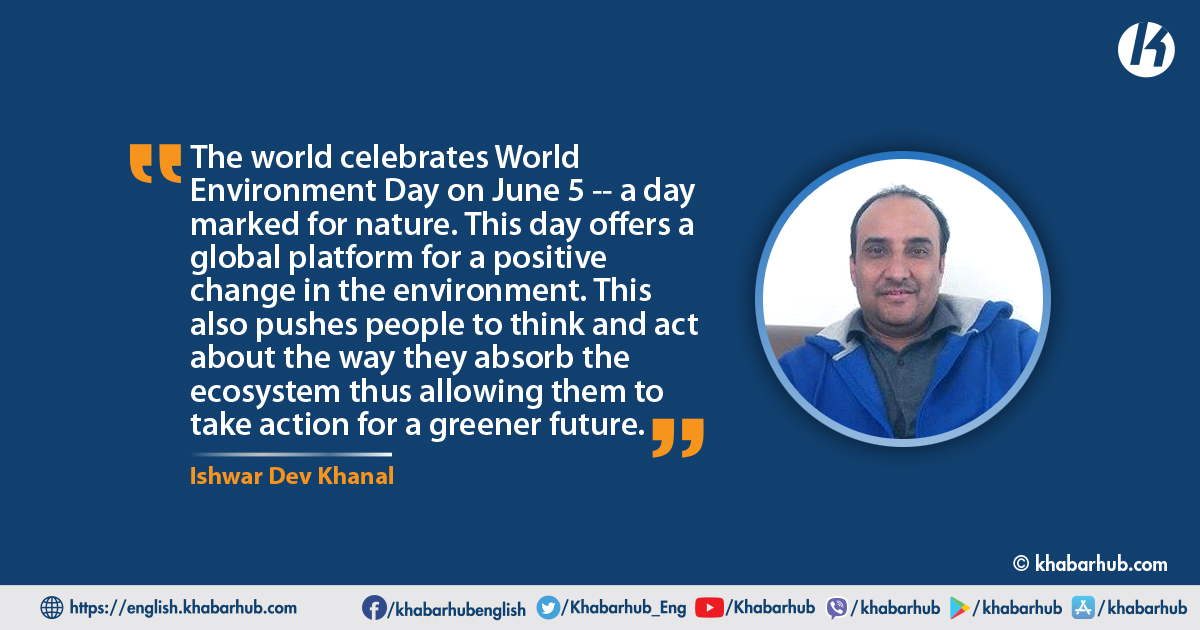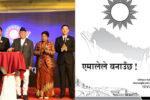Reimagine. Recreate. Restore. With these three gripping words as the theme, this year’s World Environment Day marks the beginning of the UN Decade on Ecosystem Restoration.
The globe comes together in a united call for reimagining, recreating, and restoring, besides preserving the ecosystem.
And, Nepal cannot be an exception. Has anyone acknowledged that the world loses plenty of forests every three seconds, or we have destroyed half of our wetlands over the last century?
Perhaps not! Therefore, the objective for this year is to revive those billions of hectares, farmlands, forests, mountains, and the deep oceans.
The United Nations has designated June 5 as World Environment Day to emphasize the significance of its protection.
The General Assembly in 1972 called the Conference on the Human Environment or the Stockholm Conference, adopted a resolution (A/RES/2994 (XXVII) to mark June 5 as the World Environment Day.
This year in 2021, the baton is passed to Pakistan to host the World Environment Day with the theme of ecosystem restoration, with special priority on creating a “good relationship with nature”.
The theme also aligns with the response that several environmental impacts and risks on economic development are also becoming increasingly relevant.
It should be noted that the World Economic Forum had in its 2020 Global Risk Report on risks to economic stability noted that “for the first time in the history of the Global Risks Perception Survey, environmental concerns dominate the top long-term risks…”, with “biodiversity loss” rated as the second-most impactful as well as third-most risk for the next decade.
This event will also mark the launch of the UN Decade on Ecosystem Restoration 2021-2030.
In the next 10 years, the UN along with the supporting countries, partners, and people would focus on preventing and reversing the loss of degraded natural ecosystems aimed at fighting the impacts of climate change.
Even though World Environment Day is observed once a year on June 5, it, however, doesn’t mean that people should not pay attention to the environment the rest of the days.
Even the European Union (EU), the Ministry for Foreign Affairs of Finland, and the German Federal Ministry for Economic Cooperation and Development (BMZ) are launching a new development cooperation project “Green Resilient Agricultural Productive Ecosystems (GRAPE) in Nepal”.
Funded under the Team Europe approach showcasing EU and member state cooperation in Nepal, it will contribute to the Green, Resilient, and Inclusive Development (GRID) approach, which both the Government of Nepal (GoN) and the International Development Partners Group (IDPG) have adopted to pursue economic development with a long-term sustainability lens.
GRAPE Project’s overall objective is to foster climate-resilient, green economic growth of Nepal’s Sudurpashchim and Karnali provinces which will support Nepal’s capacity to adapt agricultural practices to climate change and thus strengthen income generation of marginalized households.
The project will directly benefit socially disadvantaged groups and women in particular — from strengthened participation in value chains that are integrated into sustainable and climate-resilient agricultural ecosystems.
In fact, this is also an integral part of EU and its member states’ efforts of implementing the EU Green Deal, including the Farm-to-Fork strategy, in Nepal, and is also said to continue directly to Nepal’s Nationally Determined Contributions, particularly to “scientific research and adaptation approaches to assess and address impacts of climate change”.
Irrespective of the day, event, the theme, or the country, preserving nature is the people’s responsibility by bringing a change in their lifestyle, educating and making people aware of the impact of climate change and environmental degradation.
Moreover, climate change and the melting glaciers have posed a risk of extreme weather events such as rainfall, and flooding in Nepal.
Unfortunately, a list of 10 countries, which are most affected (1999 to 2018) from Germanwatch, publishers of Climate Risk Index-7 countries are from Asia, and 3 are from Caribbean islands.
Takeaway: What people can do to save the environment
Even though World Environment Day is observed once a year on June 5, it, however, doesn’t mean that people should not pay attention to the environment the rest of the days.
Irrespective of the day, event, the theme, or the country, preserving nature is the people’s responsibility by bringing a change in their lifestyle, educating and making people aware of the impact of climate change and environmental degradation.
Therefore, this day (June 5) offers a platform for an inspiring change in the environment, and to build a greener future.








Comment